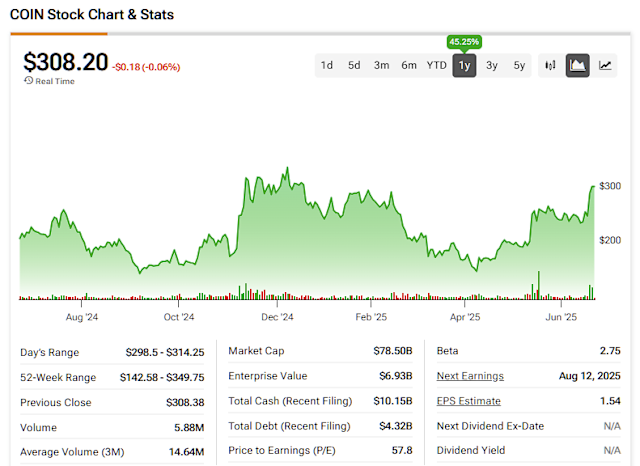Coinbase Global (COIN) Soars on Regulatory Milestones and Tokenized Trading Initiatives: Opportunities and Challenges Ahead
Coinbase Global (COIN) stock has been on a tear recently, surging after two pivotal developments: the U.S. Senate’s passage of the Guiding and Establishing National Innovation for U.S. Stablecoins (GENIUS) Act and Coinbase’s push to gain SEC approval for tokenized equity trading. Both of these developments have massive implications for the crypto economy-focused financial technology company.
The GENIUS Act Legitimizes Stablecoins and Powers USDC’s Growth
Regulatory uncertainty has long been a major overhang for Coinbase and other crypto-centric firms, but the recent progress of the GENIUS Act marks a potential turning point. Passed by the Senate on June 17 with strong bipartisan support (68–30 vote), the Act lays out the first federal framework for stablecoin regulation, including key provisions like 1:1 reserve backing in safe assets (e.g., U.S. dollars) and anti-money laundering compliance.

Crucially for Coinbase, the bill also permits non-bank entities to issue stablecoins—a major win, given the company’s deep partnership with Circle Internet Group (CRCL), the issuer of USD Coin (USDC). The company’s shares rose 33% in late Wednesday trade last week and are now trading 87% higher.
As the second-largest dollar-backed stablecoin, USDC plays a growing role in Coinbase’s business model. In the most recent quarter, USDC revenue reached $298 million, accounting for roughly 15% of Coinbase’s total revenue and growing at an impressive 51% year-over-year, more than double the company’s overall revenue growth of 23%. If enacted into law, the GENIUS Act could help legitimize and accelerate Coinbase’s stablecoin strategy, strengthening a rapidly expanding revenue stream.
Tapping the Trillion-Dollar Stablecoin Opportunity
Treasury Secretary Scott Bessent recently projected that the stablecoin market could grow to $3.7 trillion in the coming years—a staggering figure that underscores the potential of this emerging asset class. For those unfamiliar, stablecoins are a type of cryptocurrency designed to maintain a stable value by being pegged to assets like the U.S. dollar or gold. This structure allows users to benefit from fast, low-cost digital transactions while avoiding the extreme volatility typically associated with crypto assets.
As the largest registered crypto exchange in the U.S. and a key player behind USD Coin (USDC), Coinbase is strategically positioned to capture a meaningful share of this rapidly expanding market.
Coinbase’s Bold Tokenized Equities Play
At the same time, Coinbase is actively exploring tokenized trading, a technology that could enable 24/7 market access, faster settlement, and greater global reach. Tokenized equities—digital versions of traditional company shares that operate on blockchain infrastructure—have the potential to transform capital markets by improving efficiency and accessibility. Currently, however, tokenized equity trading remains prohibited in the U.S. Yet, the recent advancement of the GENIUS Act suggests a shifting regulatory climate that is becoming more receptive to digital assets. In that context, Coinbase’s efforts to influence and align with regulators appear to be well-timed and strategically positioned for future adoption.
COIN Must Navigate Legislative Hurdles
Despite recent encouraging developments, key risks still loom. The GENIUS Act, while promising, is still making its way through the legislative process—and as history shows, bipartisan support in the Senate doesn’t guarantee smooth passage in the House. Political pushback could result in amendments that dilute the bill’s benefits for companies like Coinbase. Additionally, the path to tokenized equities remains uncertain. Their future hinges not only on favorable regulation but also on broad market acceptance and infrastructure readiness, making widespread adoption a longer-term and less certain prospect.
Is Coinbase Global a Buy or Sell?
On Wall Street
COIN's surge amidst prevailing regulatory achievements and the establishment of tokenized trading initiatives augurs well for innovation in digital asset exchanges; yet, it also presents a new frontier with challenges regarding compliance complexity.














